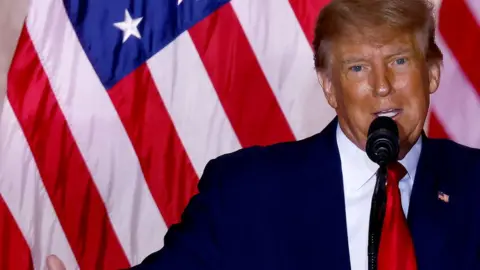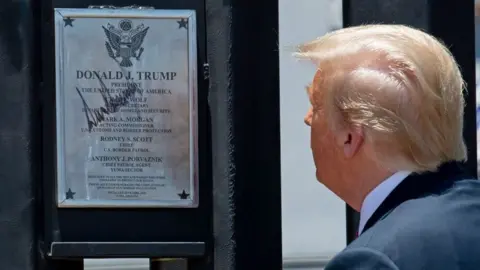Donald Trump 2024: Fact-checking the former president
 Getty Images
Getty ImagesFormer president Donald Trump announced his bid to retake the White House in 2024 on Tuesday, and made several claims regarding his four years in office.
He made only brief reference to his debunked claims of 2020 election fraud, but talked about his endorsement successes, his border wall and the current state of the economy.
Although many candidates in the midterm elections supported Mr Trump's false fraud claims, evidence is stacking up that a substantial number of voters were turned off by that message.
We checked his over-an-hour long speech for accuracy, and this is what we can say.
Endorsement success
"My endorsement success rate was 232 wins and only 22 losses," Mr Trump said. "You don't hear that from the media."
The numbers appear to be more or less accurate when it comes to the recent midterms. After the election, the Washington Examiner, a conservative publication, put the tally at 233 victories and 28 losses.
But the claim needs some context. Most of those wins were in safe seats. And the losses included some crucial races in swing states. Mr Trump backed the losing candidates for governor and senator of Arizona, the governors of Michigan and Pennsylvania, and in the Nevada senate race.
A number of candidates that made Mr Trump's election denial claims central to their platforms did worse than other Republicans.
The party as a whole had a disappointing night despite making gains in the House - and some are blaming Mr Trump for the poor performance.
 EPA
EPAEconomic recovery
"When the virus hit our shores, I took decisive action and saved lives and the US economy," Mr Trump said. "And by October of the same year [2020], America was roaring back with the number one fastest economic recovery ever recorded."
Again that's a fairly accurate statement but needs some context. The recession in early 2020, caused by the Covid pandemic and lockdowns, was deep but very quick, and the Trump administration pumped relief into the hands of millions of Americans.
Economic growth didn't stop when Mr Trump left, in fact it continued well into 2021 - which is why Mr Trump's successor, Joe Biden, also takes credit for the recovery.
The speed of the rebound was largely due to the strange nature of the pandemic recession.
Mr Trump also repeated other claims about US economic strength. We evaluated some of these just before the 2020 election - put simply, not all of them stack up.
Border wall
"We built the wall … we completed the wall," the former president said.
 Getty Images
Getty ImagesNear the tail end of the Trump administration, US Customs and Border Protection said a total of 452 miles of border wall had been built.
Most of that was replacements for existing fences or walls. Just 80 miles of new barriers were built where there were none before. Much of it is not a brick or concrete wall but bollard fencing.
BBC Reality Check took a deep dive into the figures - and construction methods - shortly before Mr Trump left office in January 2021.
Paper ballots and one night of counting?
When it comes to elections, Mr Trump did repeat two ideas that have become popular among election deniers - that ballots should be made of paper and all votes should be counted on election day.
He decried the length of the vote counting process and said: "It doesn't happen in third world countries."
Hand-marked ballots are used in many places in the United States, but they're almost always optically scanned by a computer - that makes counting votes faster.
While getting a result on election night might seem to be the norm, that's only the case when there are fairly comfortable margins of victory in big contests.
There are plenty of recent examples of US election counts dragging on for days or weeks and uncertainty over results. The 2000 presidential election between George W Bush and Al Gore is perhaps the most notable, but there are others - for instance, the 2008 Senate race in Minnesota took eight months to resolve.
In a close election with millions of ballots being counted across thousands of different jurisdictions, it's hard to see how authorities could ensure same-day results, particularly if hand-marked ballots had to be counted one-by-one.
